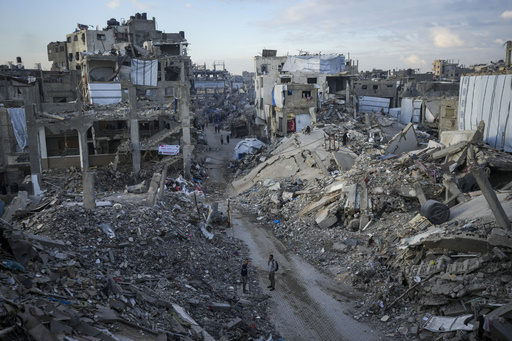
In Deir al-Balah, a town within the Gaza Strip, Saeed Abu Elaish has experienced profound personal loss. Over the previous 15 months, he lost his wife, two daughters, and numerous extended family members due to Israeli airstrikes. With his home in northern Gaza reduced to rubble, he and the remaining family members are now living in a tent amid the debris of what was once their home. Despite the devastation, Abu Elaish is resolute, especially in light of recent remarks by President Trump advocating for the transfer of all Palestinians from Gaza. Trump’s proposals have been criticized by human rights organizations, which have described them as an incitement to “ethnic cleansing” and forced displacement.
“We firmly reject and will resist any attempts to displace us from our land,” Abu Elaish proclaimed from the Jabaliya refugee camp. His sentiments echo a deep-rooted defiance among Palestinians, particularly in the wake of Trump’s shocking declarations, which emerged as many rushed back to their devastated homes following a ceasefire established last month between Israel and Hamas. Speculation on whether Trump’s comments were merely a negotiating tactic does little to quell the anxiety felt by Palestinians, who view these statements as a continuation of historical patterns of erasure dating back to the expulsion during the 1948 conflict, known to them as the “Nakba,” or “Catastrophe.”
The discourse surrounding Trump’s statements aligns with calls from radical political factions in Israel that advocate for the expulsion of Palestinians from Gaza, further amplifying the anxiety within the community. “We do not want to witness a reoccurrence of the tragedies experienced by our ancestors,” noted Abu Elaish, a health care worker who carries the weight of generational trauma.
Abu Elaish illustrated how deeply intertwined family histories are with the ongoing conflict. He shared that his grandparents faced expulsion by Israeli forces in May 1948 from their village of Hoj, located in what is now southern Israel, a fate shared by many families in the region. Their resettlement in Gaza transformed the Jabaliya camp into a densely populated neighborhood, which recently faced destruction by Israeli military operations aimed at Hamas.
Mustafa al-Gazzar, now in his 80s, recalled being just five years old when his family had to flee their home in Yabneh due to Israeli attacks in 1948. Sitting amidst the wreckage of his home in Rafah, which was annihilated during the war, he declared, “Do you think I will allow myself to be expelled and let others take my place? I would rather stay in my tent, surrounded by rubble.” He emphasized the desire to reclaim his historical homeland, rejecting any proposals that suggest he abandon his roots.
In a meeting with Israeli Prime Minister Benjamin Netanyahu, Trump suggested resettling Gaza’s Palestinians into Egypt or Jordan, asserting that the U.S. would take control of Gaza to reconstruct it as a “Riviera of the Middle East.” However, both Egypt and Jordan firmly rejected this notion. Trump’s advisors later attempted to clarify that the president’s intention was only to temporarily relocate Palestinians to facilitate reconstruction efforts, not to permanently displace them.
Amna Omar, a 71-year-old resident of Deir al-Balah, expressed her frustration towards Trump, labeling him a “madman.” During the war, she took her ailing husband to Egypt, where he unfortunately passed away. Despite her time away, she desires to return home. “Gaza is our land, our rightful home. We want to rebuild our lives here,” she asserted vehemently, wishing to avoid passing away in a foreign land.
The determination of the Palestinian populace to return to their homes and reclaim their lives remains palpable. Following the ceasefire, there has been a significant influx of individuals returning to the heavily damaged areas, rallying their spirits amidst hopelessness. Despite living in compromised conditions with scant resources and ruined neighborhoods, a collective resilience prevails. “We remain here, even if it means living in the remains of our homes — it is infinitely better than enduring humiliation elsewhere,” stated Ibrahim Abu Rizk, who returned to find his Rafah home in shambles. “For a year and a half, we have faced slaughter and destruction, and now you expect us to leave like that?”
The ceasefire agreement, mediated by the U.S., Egypt, and Qatar, facilitates a return for the displaced Palestinians alongside a proposed massive international reconstruction initiative, contingent on reaching an agreement between Israel and Hamas on territorial governance. International laws clearly prohibit the forced eviction of populations, and local rights groups have condemned Trump’s statements as establishing a roadmap toward a potential new chapter of forced displacement for Palestinians.
For decades, Palestinian refugees have sought acknowledgment of their right to return to their ancestral homes in what is now Israel, a principle upheld under international law. Yet, Israel contends that such rights do not extend to Palestinians, asserting that a mass return would disrupt the Jewish demographic majority. Throughout the protracted conflict, apprehensions among Palestinians have only intensified, with many fearing a systematic campaign to drive them into Egypt. While government officials in Israel reject this notion, some far-right voices have continued to advocate for Palestinian expulsion and the establishment of Jewish communities in Gaza.
The broader rejection of Trump’s rhetoric resonates deeply within Palestinian communities not only in Gaza but also in the West Bank and surrounding nations like Jordan and Lebanon, where substantial numbers of refugees reside. Mohammed al-Amiri in Ramallah stated, “If he wants to displace the population of Gaza, then he should facilitate their return to their original homelands, to the villages from which they were driven in 1948.” The call for justice and recognition remains strong as Palestinians confront the realities of their ongoing struggle for existence and the future of their homeland.

